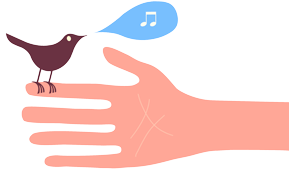 When we are anxious, often our instincts tell us to do whatever we need to do to escape the anxiety. Anxiety is so uncomfortable that people will go to great lengths to stop feeling it. Sometimes this kind of avoidance of anxious feelings is necessary — during some phases of trauma work, when feeling anxious increases danger (such as feeling anxious about driving while driving), or when there is inadequate support available (in the middle of an important work meeting with critical co-workers, for instance).
When we are anxious, often our instincts tell us to do whatever we need to do to escape the anxiety. Anxiety is so uncomfortable that people will go to great lengths to stop feeling it. Sometimes this kind of avoidance of anxious feelings is necessary — during some phases of trauma work, when feeling anxious increases danger (such as feeling anxious about driving while driving), or when there is inadequate support available (in the middle of an important work meeting with critical co-workers, for instance).
However, even when it isn’t a good idea to delve into the anxiety in the moment, it is still important to acknowledge it so it is in your awareness. For example, when you are anxious you could think to yourself, “Here’s my anxiety about work again. It’s not a good time for me to deal with it, so I’m going to put it aside for now and come back to it later.” Acknowledging your anxiety and making a choice about how to handle it in the moment may make you feel more empowered and in control.
If it is safe for you to explore your anxiety when you are having it, here are some coping strategies to try:
- Acknowledge your anxiety. If possible, say out loud: “I’m anxious about ________________.” It can also be helpful to just say aloud, “Anxious anxious anxious” until you notice the anxiety decrease.
- Remind yourself that anxiety cannot hurt you. It is just a feeling that deserves your attention.
- Pay attention to how the anxiety feels in your body. Focus on the sensations in your body when you are feeling anxious. If you are feeling tightness in your chest or sick to your stomach, pay attention to those physical feelings. Sometimes, people even discover that they aren’t feeling anxious at all, they are feeling hungry or reacting to having had too much caffeine, etc.
- Slow down your breathing. Breathe in for a slow count of five and then breathe out to a slow count of five. Do this several times. If you can calm your body, your feelings of anxiety will decrease.
- Talk to someone about how you are feeling. Tell someone who is supportive that you are feeling anxious right now and that it feels really bad.
- Continue paying attention to the anxiety as long as it is tolerable. A lot of times, just noticing and acknowledging the anxiety starts to reduce it. Watch what happens.
- If you reach the limit of what you can tolerate and are still feeling anxious, consciously put the anxiety aside. Distract yourself with an activity that requires you to think hard (eg. crossword puzzle, Sudoku, reading) or that makes you focus on your body (eg. walking, yoga, housework).
- When your anxiety has reduced enough so you feel comfortable, get curious about the anxiety. Notice what triggered the feelings. Think about whether the anxiety is related to a past experience. Look at the clock and see how long the anxiety lasted. (It’s helpful to know how long it lasts so the next time you feel anxious you can remind yourself that you will probably feel better soon.)
- Try to avoid feeling anxious about your anxiety. Feeling anxious about being anxious just increases your anxiety. Try to stick with the original feeling of anxiety instead of being anxious about the anxiety itself. If you are worrying about being anxious in the future, remind yourself that if you get anxious you can handle it and then refocus your attention somewhere else.
Psychotherapy can be helpful also. In therapy, you can get support for practicing ways to manage your anxiety. You also can explore the root causes of your anxiety so that you may get less anxious in the future. Of course, starting therapy can be anxiety-provoking all by itself, so be patient with yourself as you get started and, if you can, tell your therapist you are feeling anxious about therapy. As a therapist, when I know clients are feeling anxious about therapy, I usually can help them talk about their worries and help them to feel less anxious.
Anxiety is a normal, unavoidable part of life. Allow yourself to be aware of your anxiety and let it move through you and you will find that it passes more quickly than you anticipate.
